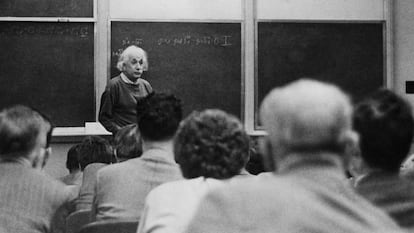What is dark energy?
Cosmologist Licia Verde responds to a reader’s question about one of the most important unsolved mysteries today in physics

The quick answer to your question could be nothing, or equally, we just don’t know. But let’s concentrate on what we do know. What we know is that scientific observation indicates that the universe is expanding at an accelerating rate. And that is extremely surprising because gravity (the force in which great distances such as astronomical and cosmological are calculated) is attractive. Isaac Newton’s famous apple fell from the tree, it did not fly off into the air.
Therefore, if gravity works in the way we expect it to and if Albert Einstein’s general theory of relativity works (and, on that point, if the GPS in our car takes us in the right direction it is because Einstein’s theory does work) then the expansion of the universe would have to decelerate, not accelerate.
But let’s go back a little. When Einstein formulated his general theory of relativity all of his calculations said that the universe was not stable, that it either had to contract or expand. But Einstein wasn’t convinced by this idea and so he added a condition to his equations that would make the universe static. This concept is known as Einstein’s cosmological constant. Looking at his field equations, Einstein swiftly realized that by adding the cosmological constant on the other side of the = symbol, it could be interpreted as the energy density of space, or vacuum energy. And he left it at that, for the time being.
The accelerated expansion of the universe could be explained by a cosmological constant
A few years later, a series of studies on the distances of galaxies led astronomer Edwin Hubble to the conclusion that the universe is expanding. Not static, but constantly expanding. This was also the first step toward the Big Bang theory and led Einstein to recognize that his cosmological constant was a mistake. However, in the 1990s, researchers Adam G. Riess, Saul Perlmutter and Brian P. Schmidt, and their many collaborators, saw that their observations indicated that the universe was expanding at an accelerating rate and that this most unexpected acceleration could be very easily explained by a cosmological constant.
Of course, their findings could also be explained by other means. Therefore, dark energy can be summed up as everything that can explain observations that we interpret as an accelerated expansion of the universe.
Could it be something other than a cosmological constant? Yes. It could be a cosmological non-constant, which is to say it could change over time. Theories suggest it wouldn’t be by much, but it is impossible to say with infinite precision what constant is exactly. Could it change in space? Yes. Again, observations say not by much, but…
Could it be that we do not fully understand gravity on such vast scales? The scientific community has made enormous efforts and as yet has found no sign that would force us to modify Einstein’s gravitational theory in this respect, but the fact that we haven’t found it yet doesn’t mean that it does not exist.
In summary, we don’t know what dark energy is. It is one of the most important unsolved mysteries today in physics. And if an accelerated expansion of the universe reminds readers of something else like inflation, it is because, probably, the two phenomena are not fundamentally that different when it comes down to it.
Licia Verde is a cosmologist and theoretical physicist, and ICREA research professor at the Institute of Cosmos Sciences at the Universitat de Barcelona.
Question emailed by Rómulo Armando Albán Villena.
English version by Rob Train.
Tu suscripción se está usando en otro dispositivo
¿Quieres añadir otro usuario a tu suscripción?
Si continúas leyendo en este dispositivo, no se podrá leer en el otro.
FlechaTu suscripción se está usando en otro dispositivo y solo puedes acceder a EL PAÍS desde un dispositivo a la vez.
Si quieres compartir tu cuenta, cambia tu suscripción a la modalidad Premium, así podrás añadir otro usuario. Cada uno accederá con su propia cuenta de email, lo que os permitirá personalizar vuestra experiencia en EL PAÍS.
¿Tienes una suscripción de empresa? Accede aquí para contratar más cuentas.
En el caso de no saber quién está usando tu cuenta, te recomendamos cambiar tu contraseña aquí.
Si decides continuar compartiendo tu cuenta, este mensaje se mostrará en tu dispositivo y en el de la otra persona que está usando tu cuenta de forma indefinida, afectando a tu experiencia de lectura. Puedes consultar aquí los términos y condiciones de la suscripción digital.








































